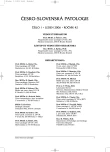Identification of Blockers of Adrenergic ß-receptors by Thin Layer Chromatography
Authors:
E. Nováková
Authors‘ workplace:
Ústav soudního lékařství a toxikologie, VFN a 1. LF UK, Praha
Published in:
Soud Lék., 51, 2006, No. 1, p. 9-15
Overview
Blockers of adrenergic ß-receptors (ß-blockers) are commonly administered in cardiology for coronary heart disease, arrhythmias, hypertension and some cardiopathic treatment. They have been also approved as a therapy of chronic heart failure recently.
From pharmacological point of view, cardioselective and non selective ß- blockers (with or without intrinsic sympathomimetic activity) are distinguished. New drugs like celiprolol, carvedilol or sotalol have been developed and so the range of the group still continues to widen out.
In toxicological routine practice we meet ß-blockers either in acute intoxication cases or in a control of patient’s adherence to prescribed therapy. Dizziness, nausea, weakness, vasoconstriction and bradycardia are their usual undesirable effects, whilst in grave cases of a drug overdose bronchoconstriction, coronary spasms, hypotension and even cardiac insufficiency may occur.
The article deals with the possibility of detection and identification of ß-blockers and their metabolites in urine by thin layer chromatography.
Key words:
ß-blockers – identification in urine – thin layer chromatography
Labels
Anatomical pathology Forensic medical examiner ToxicologyArticle was published in
Forensic Medicine

2006 Issue 1
Most read in this issue
- The Legal Aspects of Manipulation of Dead Body in the Department of Legal Medicine and Pathology
- Trauma of Cervical Spinal Cord – an Immunohistochemical Study
- Postmortem Analysis of the Group of Patients Treated with Implantable Electronic Medical Devices – Study Design
- Identification of Blockers of Adrenergic ß-receptors by Thin Layer Chromatography
